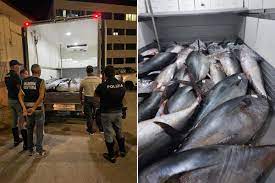Italy: Fewer fish and more rules lead to illegal catches, say fishers

Calabria: “On our coasts there is … a massive presence, that everyone can see, of poachers and illegal fishermen,” a fisher in Calabria, in southwestern Italy, told Mongabay. He said he decided to speak with this team of journalists because increased fishing of declining stocks meant “we are heading toward a point of no return.” But it was not an easy decision: He asked to remain anonymous due to fears of retaliation from other fishers and the local ‘ndrangheta or Calabrian mafia. A dozen other sources would also speak about illegal fishing in the area only off the record.
“The situations are visible to all, they are experienced every day just by spending a little time on our coasts,” he said, describing illegal activities happening in plain view, such as fishing in the river mouth or near the coast, and the use of prohibited fishing gear and unregistered amateur boats.
In Calabria, the region encompassing the toe of Italy’s boot-shaped peninsula, many fishers slip regularly between legality and illegality, as several sources told Mongabay. Even some fishers who usually work legally sometimes cross the line, and most know at least one illegal fisher, these sources said. In 2022, 13,172 crimes and administrative violations related to fishing activities were detected in Italy, or 36 per day, according to a report by Legambiente, an Italian environmental association. More than 48% of these incidents occurred in the four regions with a traditional mafia presence, including Calabria, the report says. (Italy has 15 coastal regions in all.)
The anonymous reports collected by Mongabay are borne out by police inspections and seizures, especially of species such as swordfish, juvenile sardines, and bluefin tuna, the latter of which is notably coveted and subject to strict Italian and European legislation. For example, in October 2023, a joint operation between the Coast Guard and the city of Reggio Calabria’s traffic police seized 1,500 kilograms (3,307 pounds) of bluefin tuna without the required documentation certifying its provenance, and 140 kg (309 lbs) of hake, valued at 35,000 euros (about $38,000), in the Calabrian city of Villa San Giovanni.
The seizures are evidence of a supply chain that’s hard to trace. Several investigations by the Reggio Calabria public prosecutor’s office have revealed that ‘ndrangheta families control the sale of fish. The investigations also highlight other illicit activities conducted in combination with fishing, such as drug trafficking. “[T]here have been cases of individuals who have used fishing boats to recover narcotics from the sea that were purposely abandoned in the water,” Giovanni Bombardieri, Reggio Calabria’s chief public prosecutor, told Mongabay.
At the same time, fishers describe difficulties in simply carrying on with their jobs, which are rooted in local tradition.
“I started fishing when I was 16 years old, and I have done all the jobs in the sea,” Luciano Gioffrè, 62, a fisher from the municipality of Bagnara Calabra, told Mongabay. “My mother was a bagnarota [a worker in the local fishing sector]. We have always worked at different types of fishing, depending on the season. Nowadays it is no longer possible.”
In particular, fishermen complain about Italian and European laws and the corresponding bureaucracy. “It’s fair that there are rules but not in a repressive way. I can understand, ‘you can’t do this, you can’t do that, you can’t do that.’ And in the end, what is left? There can be no generational change,” Gioffrè said, lamenting how local young people have turned away from fishing as a career because of the difficulties.
To gain bargaining power, promote their products collectively and get help navigating all the bureaucracy, many fishermen join cooperative organizations, such as La Perla del Tirreno di Bagnara Calabra.
“The biggest mistake [by the European Commission] was to issue regulations that apply to the whole Mediterranean Sea … without thinking that other non-EU countries … are not subject to these regulations,” the co-op’s director, Antonio Lombardo, told Mongabay. For example, he said European fishers hunt swordfish in the same waters as Tunisian and Moroccan fishers, but are subject to much stricter regulations: “So they can continue to fish for swordfish with … tools that are now forbidden for us.”





